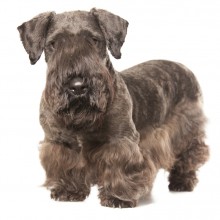Cesky Terrier
Lifestyle Needs
 The Kesky Terrier is said to be the national dog of the Czech Republic. He is also reputed to be relatively gentle for a terrier breed. The Kesky is around 32 centimetres tall and is slightly longer in the back than he is tall. His long and somewhat silky coat requires frequent grooming and some trimming. The Kesky is usually non-aggressive and biddable as a companion. He would prefer to live in a house with a garden and needs at least one hour of exercise every day.
The Kesky Terrier is said to be the national dog of the Czech Republic. He is also reputed to be relatively gentle for a terrier breed. The Kesky is around 32 centimetres tall and is slightly longer in the back than he is tall. His long and somewhat silky coat requires frequent grooming and some trimming. The Kesky is usually non-aggressive and biddable as a companion. He would prefer to live in a house with a garden and needs at least one hour of exercise every day.
Genetic Diversity
(Known as Coefficient of Inbreeding: 'COI'. It should be as low as possible.)
The UK Kennel Club breed average COI is - See 'A Beginners Guide to COI'
Gene Pool Size
(Known as Effective Population Size: 'EPS')
As a numerically very small breed, great care needs to be taken to ensure that as much genetic diversity as possible is maintained when breeding
EPS is a measure of how many individuals are contributing genetically to a breed population. It is a measure of the size of the gene pool in a breed. Lower than 100 is considered critical by conservationists and below 50 brings a breed close to extinction. For more information see the Kennel Club article.
Health and Welfare Problems due to Conformation
(Body shape and physical characteristics)
None known
BVA/KC Health Schemes: www.bva.co.uk/chs
BVA/KC Eye Scheme
Estimated Breeding Values (EBVs) : No EBVs are currently available for this breed
www.thekennelclub.org.uk/about-ebvs
DNA Tests Available
DogWellNet and IPFD Harmonisation of Genetic Testing for Dogs (HGTD)
www.dogwellnet.com/breeds
- Primary lens luxation (PLL)
Availability of a DNA test does not mean that it is always necessary or even desirable for breeders to use this test.
Other Breed-Specific Health Screening Schemes
Patella luxation test
Ask the breeder to show you the certificates for the above tests/screening for both parents. If any of the above tests have not been considered necessary by the breeder (and there may be good reasons), ask her to explain why.
Other Diseases Reported
(For which there are currently no genetic or screening tests for sire or dam)
- Scotty Cramp
- Luxating Patella
- Cancer
Ask the breeder about the medical history of the parents, grandparents and great grandparents. Consider carefully whether to purchase a puppy if some of these or other diseases are in the family line.
Ask about the breeder’s policy in cases of serious genetic diseases occurring to your puppy in later life. Good breeders will request to be informed of such events in order to improve future breeding decisions.
You are strongly advised to buy from a breeder who uses (or is prepared to use) the AWF Puppy Contract and Puppy Information Pack (PIP): www.puppycontract.org.uk
The breeder should also be familiar with the CFSG/DBRG Code of Practice for Dog Breeding